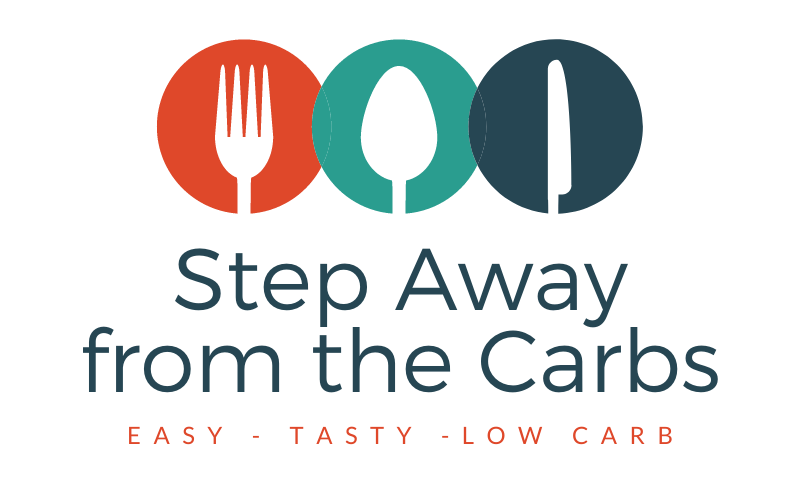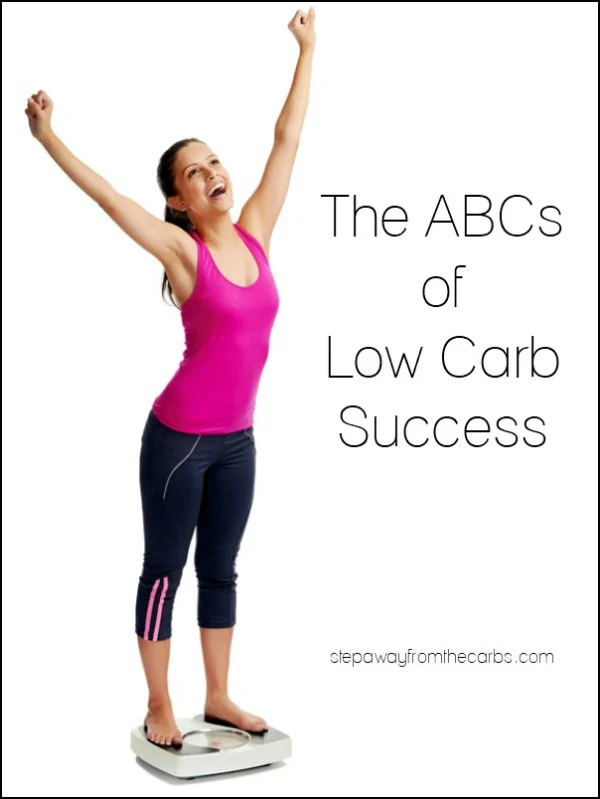Do you ever wonder what the low carb diet benefits are? Why it works? And why it is so good for you? Read this scientific analysis of low carb diets.

This post may contain affiliate links.
There is growing evidence that reducing carbs is beneficial your mind and body. We delve into the low carb diet benefits that are a direct result of eating less carbs plus bonus benefits you can expect along the way. Some health-enhancing effects are immediate while others support longer term well-being. Get ready for some scientific reasons to enjoy more of your favorite low carb treats!
What’s Wrong with Carbs?
Less than a century ago we ate mainly fresh and seasonal food produced locally. We relied on what nature provided and, critically, when it was provided. Seasonal growth comes in cycles; things are fresh, green and blossoming in the spring, spend all summer absorbing sunlight, and are ready to harvest in the fall.
Sunlight is turned into natural sugars (carbohydrates) inside the fruits and vegetables to store the sun’s energy. In underground vegetables, like carrots or potatoes, energy is stored as starchy sugars to nourish the plant when winter comes. In fruits, like orange and peach, energy is stored as sweet flesh which nurtures the seed when it falls to the ground.
Humans and animals use fat for long-term energy storage and we evolved to dine on nature’s bounty in fall and fatten up for winter’s bleak conditions. Biological drives like appetite and pleasure from eating sweet foods helped us put on sufficient weight for winter. Carbs trigger our hunger and increase our ability to make fat. Harvest time provides a short window during which seasonal food is ripe – so it was important we could ‘binge’ and turn it into fat for storage. Being synchronized with nature kept us alive.
The Food Landscape
Then came the industrial revolution and we started eating factory produced goods. Food preservation and processing distorted the natural seasonal cycles and altered our relationship with food. Our finely-tuned survival mechanisms were bombarded with new ingredients like refined white sugar. The crack-cocaine of sweetness acts like a narcotic in the brain, over stimulating natural reward and pleasure pathways and, just like drug addicts, leaves us craving more [i].
Industrial farming techniques have also changed the nutritional and flavor profiles of fruits and vegetables. The introduction of fertilizers and pesticides increased crop yield, by weight, while nutritional value was reduced, often selecting crop varieties that were sweeter.
Modernized farming and food processing have created a supply of food which is high in carbs, but low in nutrition.[ii] This confuses our natural biology and we overeat to try and meet our nutritional needs.[iii]At the same time the natural pleasures in life are dwarfed by the pleasure-hit from high-carb foods – our brains get wired to seek out highly-processed foods to satisfy a drug addiction we don’t even know we have![iv]
Epidemics of Obesity
Increasing amounts of sugar in our food has increased our waistline and also our risk of disease. Our bodies evolved to thrive on eating a small amount of natural sugars from fruits and when we eat refined sugars on a daily basis it has a huge impact.
Our ability to process sugar has two modes: regular and panic! When we eat a piece of fruit the body recognizes it, digests it and responds appropriately with hormones, specifically insulin, to take energy into the cells and be used throughout the day. But when we eat foods which are foreign to the body, containing pure concentrated sugars, the result is panic!
Massive amounts of insulin are produced to mop-up the sugars and quickly turn them into fat. Instead of a nice gentle ‘slow burn’ it’s like chucking a can of gasoline on a BBQ. It burns very hot for a few minutes but the energy is used up very quickly and soon we want more. This creates cravings for more food and feelings of lethargy after the panic has died down and blood-sugar levels plummet. You could keep a BBQ lit by frequently chucking gasoline on it but it would be much better to find a better, longer lasting fuel.
Sugar intake and panic-driven regulation of blood glucose levels puts stress on the pancreas and other hormonal glands.[v] Confused and distressed by the constant influx of high-strength carbs, including refined flour, the body stops listening to its own signals and gradually becomes insulin resistant. The insulin resistance is the body saying “stop feeding me so much sugar I don’t need it!” but we ignore the communication and keep eating – driven by the addiction and emotional cravings for pleasure and comfort.
Stuck with Sugar
Things which are sweet are sticky: for example maple syrup, honey, and molasses are all naturally adhesive. The same stickiness continues when we eat them. An excess of sugar in the blood causes red blood cells, carrying oxygen round the body, to become sticky or ‘glycated.’ Testing levels of sticky red-blood-cells is used to measure blood sugar levels over the last 1 to 3 months (the lifespan of red blood cells).
These sticky red blood cells (called HbA1c) cannot effectively carry oxygen round the body and get stuck in the blood vessels critical to transporting blood and nutrients. Elevated levels of glucose in the blood, after a single carb-loaded meal, contributes to sticky blood and a deterioration of the blood vessels called angiopathy[vi].
Oxidative Stress
Oxidation and antioxidants are nutritional buzzwords which have a big impact on health. Oxidation is a by-product of metabolism: when the body ‘burns’ food for energy waste is produced. One type of waste is ‘Reactive Oxygen Species’ or ROS – the ROS are troublemakers! They are highly reactive and unstable, looking for proteins and other substances to react with. They also overstimulate the immune system and increase the risk of auto-immune conditions.
Fortunately, the body has natural anti-oxidants to neutralize the ROS before they do damage. But, our levels of anti-oxidants decline with age and we often don’t have enough. The impact of excessive ROS can be seen in the aged-skin of smokers where ROS form smoke damage collagen in the skin. Oxidative damages proteins and DNA increasing the risk of many diseases including heart disease, cancer and diabetes[vii].
So what’s oxidative stress got to do with diet? Imagine the ROS is a bit like soot created as you burn wood on an open fire. Some wood burns nicely, with minimal smoke and produces a good level of heat. But, some wood will burn with a lot more smoke and burns cooler. It’s the same with the foods we eat. Fats are naturally more efficient, they create less ‘soot’ (ROS) than carbs boosting our energy efficiency.[viii] So eating a diet focused more on fats, fiber and protein produces less damaging ROS and reduces age-associated damage to collagen and other proteins.[ix]
In essence, diets high in carbs make you age faster internally and externally – anti-aging is one of the low carb diet benefits I bet you didn’t expect! The increased lifespan and prolonged health of low-carb and no-carb diets is an exciting and expanding area of medical research.[x]
Vitamin Competition
When you eat carbs they are quickly broken down into simple sugars in the mouth by an enzyme called salivary amylase. No matter what carbs you eat they get broken down into the smallest building blocks, the most important one is glucose.
Vitamin C is an antioxidant and an essential vitamin we need to consume on a daily basis. Minor Vitamin C deficiencies slow wound healing and reduce our ability to maintain a healthy immune system. Unfortunately Vitamin C and glucose share the same cellular transport system.
This means when glucose levels are high, after eating a high-carb meal, the vitamin cannot get into cells to work its magic – Vitamin C has to fight it out with glucose to get absorbed.[xi] Vitamin C is critical for health and if it has to continually compete with sugar to do its job the immune system suffers and there is an increased risk of heart disease.[xii]
Feeding Cancer
Cancerous cells adapt their metabolism to grow, divide and spread quickly and they rely on glucose to fuel their rapid expansion. Nutritional therapies to target cancer cell growth eliminate glucose as the fuel source for cancerous cells. At the same time the low-glucose environment triggers protective genes which further reduce cancer cell growth.[xiii] Some research even suggests that elevated blood glucose levels create an environment which initiates cancerous growth in the first place.[xiv]
The cancer’s cells need to use sugar, not fat, for fuel is called the Warburg effect. Alongside traditional cancer therapies this nutritional approach to ‘starving out’ the cancer and slowing its growth is showing remarkable promise as a nutritional treatment[xv]. More research is needed, but, the anti-cancer effect is one the most astounding low carb diet benefits.
Mental Health
The brain uses neurotransmitters to communicate between cells. Eating a high-carb diet promotes glutamate, which is a stimulatory signal (like the accelerator in a car). Eating low-carb promotes GABA (which is like the brake) making us feel calm. Many low carb dieters report feeling less anxious and generally happier and with increased mental clarity.
Using nutritional therapies to treat mental disorders is still in its infancy but shows promise for a wide range of conditions[xvi], and nutritional psychiatry has established firm links between food and mood[xvii]. Anecdotal evidence has shown improvement in anxiety, bipolar and even schizophrenia when reducing carbs.[xviii] Migraine suffers also have been shown clinically to reduce severity, frequency and medication when cutting carbs.[xix]
Elevated blood glucose and insulin resistance is also linked to neuro-degenerative diseases like Alzheimer’s (nicknamed Type 3 Diabetes)[xx]. The risk of Alzheimer’s and age-related mental health issues, like dementia, is increased with high carbohydrate diets and decreasing carbs while increasing essential fatty acids can prevent or slow neurodegeneration.[xxi]
Attention Deficit Hyperactivity Disorder (ADHD) is another mental health issue associated with increased sugar consumption[xxii]. Cutting carbs and eliminating wheat improves or eliminates symptoms of ADHD and significantly improves children’s behavior.[xxiii]
Heart Health
Raised blood pressure puts stress on the heart and is the biggest risk factor for heart disease. Fortunately yet another one of the low carb diet benefits is that it reduces blood pressure[xxiv]. Studies show reductions in various risk factors for heart disease including blood lipids and blood pressure are reduced with a low carb diet.[xxv]
Cholesterol levels are another risk factor for heart health and they also improve when reducing carbs, specifically HDL cholesterol is lowered and LDL particle number and size is improved[xxvi]. Heart disease is usually a result of multiple factors, but, research is showing that low-carb reduces several of the biggest risk factors without the need for medications.[xxvii]
Metabolic Health
The way the body metabolizes energy from food is controlled by different hormones and processes. Sadly there are a growing number of metabolic conditions, including diabetes and metabolic syndrome, which are linked to high-carb diets[xxviii].
The complex issues surrounding weight and hormonal health have created a kind of chicken and egg problem where it’s hard to tell if obesity is the cause or result of metabolic issues. One thing is for sure: cutting carbs makes weight loss easier in people with poor blood sugar management, (for example pre-diabetics and obese people).
Since carbs stimulate weight-gain and promote appetite it’s no wonder people find weight loss diets easier when they are low carb. Eating low-carb even changes your brain and tongue’s sensitivity to sweetness while normalizing insulin levels and keeps you feeling full for longer.
For overweight individuals retraining metabolic hormones like insulin is critical to losing weight and recovering health, and low-carb eating does just that.[xxix] Low-carb naturally makes us better at fat burning, hence the weight loss, but also helps with maintaining muscle mass, performance and endurance as the body trains to use energy reserves instead of needing constant fuel.[xxx]
Low Carb Diet Benefits
Studies show that diet plans which reduce (but don’t totally eliminate) carbs have beneficial effects on multiple aspects of our health and as long as sufficient calories are consumed then side effects are rare.[xxxi] The health benefits vary from one person to another but include some or all of the following:
- Significantly reduced risk of lifestyle diseases (cancer, heart disease, diabetes, Alzheimer’s)
- Anti-aging (reducing oxidative damage to the skin and organs)
- Immune supporting (reducing inflammation and increasing Vitamin C uptake)
- Neuro-protective, mood stabilizing and cardio-protective!
Bonus Benefits
Supermarket shelves are stocked with 75% highly processed foods packed with carbohydrates. Lacking nutrition and loaded with chemicals, the simple choice to cut carbs results in the exclusion of industrially produced foods. Good! Processed foods are linked to a wide variety of mental and physical health issues – a 10% increase in ultra-processed foods increases cancer risk by at least 10%[xxxii]
The Western diet is the unhealthiest diet possible and any attempt to revert to more natural and nutritious foods will improve health. Western processed diets are being linked to an increasing list of health concerns, including actively shrinking key regions of the brain![xxxiii]
Eating low carb involves more conscious choice of the foods you build your body from. Mindless eating and casual snacking are associated with carbs and immediate gratification. When you have to actually plan, prepare and cook your meals from fresh a lot more thought is involved. Mindfully choosing food for its nutritional value will naturally lead to better, healthier, choices. The lack of convenience low-carb foods is good for your health and learning to lovingly prepare your own delicious low-carb meals could be one of the best things you can do for your long term well-being.
Low Carb Conclusion
For a long time the media and medical narrative was that ‘low-fat’ is healthy. Now it transpires that the original research blaming fat was in fact paid for, and dramatically influenced by, the billion-dollar sugar industry.[xxxiv] The Sugar Research Foundation armed with some heavy-duty marketing and propaganda steered us away from the sweet culprit and pointed the finger at fat.
The ‘lipid hypothesis’ (suggesting fats caused heart disease) has steered government guidelines and medical advice for decades despite significant contradictory evidence.[xxxv] Industry influences remains significant and outdated ideas take a long time to change, fortunately the public is leading the trends in cutting carbs and increasing healthy fats essential for our well-being.[xxxvi]
It is becoming clear that we simply can’t cope with the carbohydrate intake that has become ‘normal’ – our bodies thrive with a limited amount. In the past we simply didn’t have access to enough carbs to cause a problem, now we are bombarded with them in virtually all processed foods. Cutting carbs could be the radical key to longer and healthier lives without the onslaught of lifestyle diseases and mental health issues.
This article was written by Morwenna Gould, who has a degree in medical biochemistry and is studying for a diploma in nutritional therapy. Her vision is to empower people with actionable information about natural ways to improve physical,mental and emotional well-being.
If all the new language is overwhelming you – check out my guide to Low Carb Vocabulary and Acronyms!
[i]Wiss DA, Avena N, Rada P. Sugar Addiction: From Evolution to Revolution. Front Psychiatry. 2018;9:545.https://www.ncbi.nlm.nih.gov/pmc/articles/PMC6234835/
[ii]Wallinga D. Today's Food System: How Healthy Is It?. J Hunger Environ Nutr. 2009;4(3-4):251-281. https://www.ncbi.nlm.nih.gov/pmc/articles/PMC3489133/
[iii]Troesch B, Biesalski HK, Bos R, et al. Increased Intake of Foods with High Nutrient Density Can Help to Break the Intergenerational Cycle of Malnutrition and Obesity. Nutrients. 2015;7(7):6016-37.https://www.ncbi.nlm.nih.gov/pmc/articles/PMC4517043/
[iv]Schulte EM, Smeal JK, Lewis J, Gearhardt AN. Development of the Highly Processed Food Withdrawal Scale. Appetite. 2018;131:148-154.https://www.ncbi.nlm.nih.gov/pubmed/30227182
[v]Lamb MM, Frederiksen B, Seifert JA, Kroehl M, Rewers M, Norris JM. Sugar intake is associated with progression from islet autoimmunity to type 1 diabetes: the Diabetes Autoimmunity Study in the Young. Diabetologia. 2015;58(9):2027-34.https://www.ncbi.nlm.nih.gov/pmc/articles/PMC4529377/
[vi]Avignon A, Monnier L. [Specific effect of postprandial glycemic peaks on HBA1c and angiopathy].Diabetes Metab. 2000;26Suppl 2:12-5.https://www.ncbi.nlm.nih.gov/pubmed/10975044
[vii]Mandal P. Potential biomarkers associated with oxidative stress for risk assessment of colorectal cancer. NaunynSchmiedebergs Arch Pharmacol. 2017;390(6):55https://www.ncbi.nlm.nih.gov/pubmed/28229171
[viii]Vial G, Dubouchaud H, Couturier K, et al. Effects of a high-fat diet on energy metabolism and ROS production in rat liver.J Hepatol. 2011;54(2):348-56.https://www.ncbi.nlm.nih.gov/pubmed/21109325
[ix]Rhyu HS, Cho SY, Roh HT. The effects of ketogenic diet on oxidative stress and antioxidative capacity markers of Taekwondo athletes. J ExercRehabil. 2014;10(6):362-6.https://www.ncbi.nlm.nih.gov/pmc/articles/PMC4294438/
[x]Roberts MN, Wallace MA, Tomilov AA, et al. A Ketogenic Diet Extends Longevity and Healthspan in Adult Mice. Cell Metab. 2017;26(3):539-546.e5.https://www.ncbi.nlm.nih.gov/pmc/articles/PMC5609489/
[xi]Chen L, Jia RH, Qiu CJ, Ding G. Hyperglycemia inhibits the uptake of dehydroascorbate in tubular epithelial cell. Am J Nephrol. 2005;25(5):459-65.https://www.ncbi.nlm.nih.gov/pubmed/16118484
[xii]Price KD, Price CS, Reynolds RD. Hyperglycemia-induced ascorbic acid deficiency promotes endothelial dysfunction and the development of atherosclerosis. Atherosclerosis. 2001;158(1):1-12.https://www.ncbi.nlm.nih.gov/pubmed/11500168
[xiii]Annibaldi A, Widmann C. Glucose metabolism in cancer cells. CurrOpinClinNutrMetab Care. 2010;13(4):466-70.https://www.ncbi.nlm.nih.gov/pubmed/20473153
[xiv]Onodera Y, Nam JM, Bissell MJ. Increased sugar uptake promotes oncogenesis via EPAC/RAP1 and O-GlcNAc pathways. J Clin Invest. 2014;124(1):367-84.https://www.ncbi.nlm.nih.gov/pmc/articles/PMC3871217/
[xv]Weber DD, Aminazdeh-gohari S, Kofler B. Ketogenic diet in cancer therapy.Aging (Albany NY). 2018;10(2):164-16https://www.ncbi.nlm.nih.gov/pmc/articles/PMC5842847/
[xvi] Deans E, Dietary Treatment for Bipolar disorder, Evolutionary Psychiatry, Psychology Today, 2011. https://www.psychologytoday.com/us/blog/evolutionary-psychiatry/201110/dietary-treatment-bipolar-disorder
[xvii]Marx W, Moseley G, Berk M, Jacka F. Nutritional psychiatry: the present state of the evidence. ProcNutr Soc. 2017;76(4):427-436.https://www.ncbi.nlm.nih.gov/pubmed/28942748
[xviii]Phelps JR, SiemersSV, El-mallakh RS.The ketogenic diet for type II bipolar disorder.Neurocase. 2013;19(5):423
https://www.ncbi.nlm.nih.gov/pubmed/23030231
[xix]Di lorenzo C, Coppola G, Sirianni G, et al. Migraine improvement during short lasting ketogenesis: a proof-of-concept study. Eur J Neurol. 2015;22(1):170-7.https://www.ncbi.nlm.nih.gov/pubmed/25156013
[xx]Kandimalla R, Thirumala V, Reddy PH. Is Alzheimer's disease a Type 3 Diabetes? A critical appraisal.BiochimBiophysActaMol Basis Dis. 2017;1863(5):1078-1089.https://www.ncbi.nlm.nih.gov/pmc/articles/PMC5344773/
[xxi]Henderson ST. High carbohydrate diets and Alzheimer's disease.Med Hypotheses. 2004;62(5):689-700.https://www.ncbi.nlm.nih.gov/pubmed/15082091
[xxii]https://www.ncbi.nlm.nih.gov/pubmed/21904085
[xxiii]Pelsser LM, Frankena K, Toorman J, et al. Effects of a restricted elimination diet on the behaviour of children with attention-deficit hyperactivity disorder (INCA study): a randomised controlled trial. Lancet. 2011;377(9764):494-503.https://www.ncbi.nlm.nih.gov/pubmed/21296237
[xxiv]Bosse JD, Lin HY, Sloan C, et al. A low-carbohydrate/high-fat diet reduces blood pressure in spontaneously hypertensive rats without deleterious changes in insulin resistance. Am J Physiol Heart Circ Physiol. 2013;304(12) https://www.ncbi.nlm.nih.gov/pmc/articles/PMC3680768/
[xxv]Foraker RE, Pennell M, Sprangers P, VitolinsMZ, Degraffinreid C, Paskett ED. Effect of a low-fat or low-carbohydrate weight-loss diet on markers of cardiovascular risk among premenopausal women: a randomized trial. J Womens Health (Larchmt). 2014;23(8):675-80.https://www.ncbi.nlm.nih.gov/pmc/articles/PMC4129664/
[xxvi]Santos FL, Esteves SS, Da costa pereira A, YancyWS, Nunes JP. Systematic review and meta-analysis of clinical trials of the effects of low carbohydrate diets on cardiovascular risk factors.Obes Rev. 2012;13(11):1048-66.https://www.ncbi.nlm.nih.gov/pubmed/22905670
[xxvii]Hu T, Bazzano LA. The low-carbohydrate diet and cardiovascular risk factors: evidence from epidemiologic studies. NutrMetabCardiovasc Dis. 2014;24(4):337-43.https://www.ncbi.nlm.nih.gov/pubmed/24613757
[xxviii]Park S, Ahn J, Kim NS, Lee BK. High carbohydrate diets are positively associated with the risk of metabolic syndrome irrespective to fatty acid composition in women: the KNHANES 2007-2014. Int J Food SciNutr. 2017;68(4):479-487.https://www.ncbi.nlm.nih.gov/pubmed/27822963
[xxix]Astrup A, Hjorth MF. Low-Fat or Low Carb for Weight Loss? It Depends on Your Glucose Metabolism. EBioMedicine. 2017;22:20-21.https://www.ncbi.nlm.nih.gov/pmc/articles/PMC5672079/
[xxx]Chang CK, Borer K, Lin PJ. Low-Carbohydrate-High-Fat Diet: Can it Help Exercise Performance?.J Hum Kinet. 2017;56:81-92.https://www.ncbi.nlm.nih.gov/pmc/articles/PMC5384055/
[xxxi]Wylie-rosett J, Aebersold K, Conlon B, Isasi CR, Ostrovsky NW. Health effects of low-carbohydrate diets: where should new research go?. CurrDiab Rep. 2013;13(2):271-8.https://www.ncbi.nlm.nih.gov/pmc/articles/PMC3595318/
[xxxii]Fiolet T, Srour B, Sellem L, et al. Consumption of ultra-processed foods and cancer risk: results from NutriNet-Santé prospective cohort. BMJ. 2018;360:k322.https://www.ncbi.nlm.nih.gov/pmc/articles/PMC5811844/
[xxxiii]JackaFN, Cherbuin N, Anstey KJ, Sachdev P, Butterworth P. Western diet is associated with a smaller hippocampus: a longitudinal investigation. BMC Med. 2015;13:215.https://bmcmedicine.biomedcentral.com/articles/10.1186/s12916-015-0461-x
[xxxiv]Wise J. Sugar industry paid for dietary research in 1960s, analysis shows. BMJ. 2016;354:i4936.https://www.bmj.com/content/354/bmj.i4936
[xxxv]Dubroff R. A Reappraisal of the Lipid Hypothesis. Am J Med. 2018;131(9):993-997.https://www.amjmed.com/article/S0002-9343(18)30404-2/fulltext
[xxxvi]Liu AG, Ford NA, Hu FB, Zelman KM, Mozaffarian D, Kris-etherton PM. A healthy approach to dietary fats: understanding the science and taking action to reduce consumer confusion. Nutr J. 2017;16(1):53.https://www.ncbi.nlm.nih.gov/pmc/articles/PMC5577766/
Main Sunset Photo by Tim Foster on Unsplash



Evalyn Burton
Monday 11th of January 2021
I found this very interesting, some aspects new to me, looking forward to next installment, thank you, Joy